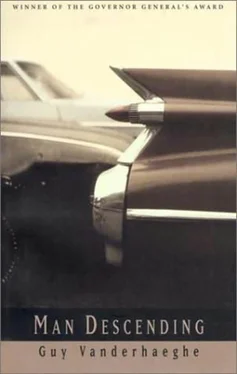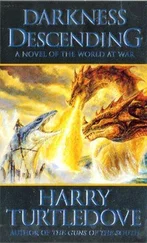“Sure,” said Wesjik sarcastically, “he’s one honey of a guy. He understands me.”
“Is that right?” said Joe.
“Hey,” the kid said, “give me the Dutch-uncle treatment and let’s get out of here. There’s a draft. I’m getting cold.”
“I’m sorry, Mr. Wesjik,” said Joe. “What is it? Is it your hands that are cold?”
“Yeah,” said the kid, smiling, “my hands are terribly cold. I think I got chilblains maybe.”
“Put them in your pockets.”
“What?”
“Put your goddamn hands in your pockets if they’re cold,” said Joe calmly. To himself he said, I don’t give a shit any more. About anything. Let it ride.
“You swore,” said Wesjik surprised. “You swore at me.”
“Put your goddamn hands in your pockets, Wesjik,” said Joe. Get them in there, Wesjik, he thought. I’m an old man. Get them in there.
He could see he was beginning to scare the kid. He didn’t mind. Maybe the kid thought he was crazy. Wesjik put his hands slowly into his pockets, licked his lips and tried to freeze his smart-ass smile on his lips.
“How old are you, Wesjik?” he asked.
“What?”
“How fucking old are you, Wesjik? And the word is pardon.”
“Eighteen.”
“Is that right? Eighteen? Is that your correct age, eighteen?”
“Yes.”
Joe could barely hear his answer. “I didn’t hear that, Wesjik. How old?”
Wesjik cleared his throat. “Eighteen,” he said a little more loudly.
“My brother was dead at your age,” said Joe. “He died in Italy during the Second World War. Ever hear of the Second World War, Wesjik? Any knowledge of that little incident?”
“Yes.” A whisper.
“Do you want to know something, Wesjik?” said Joe, his voice rising dangerously. “I’m so tired. I’m so goddamn tired. I wish I had had that fucking chance,” he said. “I wish I could have died when I was eighteen.” He looked around the vestibule, surprised by what he had said, as if searching for the source of that idea. But it was true. His saying it had made it true. “That’s what I wish now, looking back. You know why?”
“Let me out of here,” the kid said, whining. “You’ve got no business keeping me here, swearing at me!”
“Because I didn’t know life was shit,” said Joe, ignoring him. “I didn’t know it was taking shit, year after year. I didn’t know life was putting up with punks who crap on everything they can’t understand, who piss on everything they can’t eat or fuck – just to ruin it for someone else. To make it unusable.”
“I’m sorry,” said Wesjik. But Joe knew he wasn’t. He was just afraid. Most of these kids thought they were the same thing. You were never sorry unless you were scared. Only when it paid.
“I want you to say this after me,” said Joe. “So listen carefully, Wesjik. Here goes:
“The splendor falls on castle walls ,
And snowy summits old in story;
The long light shakes across the lakes ,
And the wild cataract leaps in glory .
“Now you say it, Mr. Wesjik – with feeling. Like I did.”
“I can’t,” said Wesjik. “I don’t remember. Let me out of here.”
“You can’t?” said Joe. “Why? Because you don’t choose to, or because you’re stupid?”
“I ain’t stupid,” said Wesjik sullenly. “You guys aren’t allowed to call us stupid.”
“Yes, you are,” said Joe, doubling his hand behind his back into a fist. “You’re stupid, Wesjik. Otherwise you wouldn’t stand around somebody who is as pissed off at you as I am with your hands in your pockets.” And that said, Joe hit the kid before he could drag his hands out of his pockets and cover up.
Of course he had been forced to resign. But that was no hardship. He was eligible for a pension. There was talk of a court case and that frightened him, but his lawyer smoothed it out. In a meeting with the parents and their lawyer, Joe had calmly said he had hit the kid because the kid had spat on him. He could see that Mr. and Mrs. Wesjik weren’t sure how far they could trust their kid, and that was an advantage. Their lawyer quite correctly pointed out that being spat on didn’t justify a broken jaw. Joe was glad to see they had swallowed the lie. He consoled himself by convincing himself it was metaphorically true.
Joe didn’t bother filling Mark in on any of the details. He could see his son didn’t know what to make of the way he was acting. And the boy was particularly disturbed by the way he went at the bottle. He had never really seen his father drunk before and it set his teeth on edge.
“Jesus,” he said, noting the level of liquid in the bottle of Scotch, “there isn’t a prize at the bottom of that, Dad. It isn’t Crackerjack. Slow down.”
“That’s where you’re wrong, my boy,” said Joe. “There’s a prize. Oh yes, there certainly is.” He poured himself another tumbler.
“Well, just remember you have to find your way home tonight,” Mark said, trying to maintain a light tone and avoid sounding preachy.
“If worse comes to worst,” said Joe, “I shall rely on the good offices of London’s finest.”
“Maybe you should just ease up a bit. Joan’ll make some coffee.”
“Joan is English,” said Joe, suddenly belligerent. “What the hell does she know about making coffee?”
“And who the hell taught me my manners?” said Mark sharply.
The party held in Joe’s honour was Mark’s way of asking to be forgiven for the quarrel that had resulted. Joe’s way of apologizing was to arrive in a taxi laden with gifts: several bottles of booze, roses for Joan, a canned ham, cheeses, pickles. He was careful to arrive sober.
The two tiny rooms were filled with Mark’s and Joan’s student friends. They were expatriates. There was an American couple and an Aussie studying to be an engineer, and the rest were Canadian graduate students mining the English libraries.
The atmosphere was a happy one. They greeted the arrival of the extra bottles with cheers. It was obvious that they were all a little hard-up and this wealth of liquor was unexpected and entirely appreciated.
But Joe knew it was a place where he didn’t belong. They were polite. They asked his impressions of England. Gave him names of inexpensive restaurants. Made suggestions for day excursions outside of London. Reviewed the latest stage offerings. But he had really nothing in common with these young people. They were full of their work and anxious to regale friends with tales of the idiosyncrasies of thesis advisors or the smarminess of English students. More than ever before, Joe felt as if he were disconnected and out of touch with his surroundings. After introductions he willingly disengaged himself from their conversations and leaned against a wall with a drink in his hand, watching.
There was something that bothered him about his son and his friends. They didn’t much like England. But they could leave it at that. Home was what bothered them, seemed to nag at them like a sore tooth. It seemed that as expatriates they were afraid the country they left behind was going to embarrass them, pull down its pants on the world stage. The American was the most afraid of this.
“Ford,” he said. “Gerald Ford. I mean, there’s a limit to it. Nixon was an unshaved weasel – but Ford! He hit somebody with a golf ball again the other day.”
The girl from Edmonton who was studying at the Royal Academy said, “I heard it was a tennis ball. The BBC announcer said tennis ball. And then he gave that little knowing smile – the one that means only in America, folks.”
They were allies here apparently.
“I don’t know why the English press can’t leave Margaret Trudeau alone,” said a blocky girl who had a settled air of grievance about her. “They certainly kept their mouths shut about Mrs. Simpson and Edward, didn’t they? A fine sense of honour there. When it comes to their own precious royal family.”
Читать дальше












